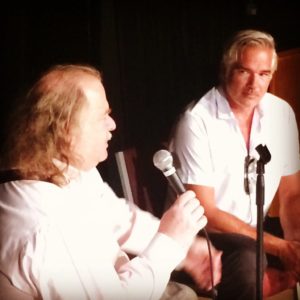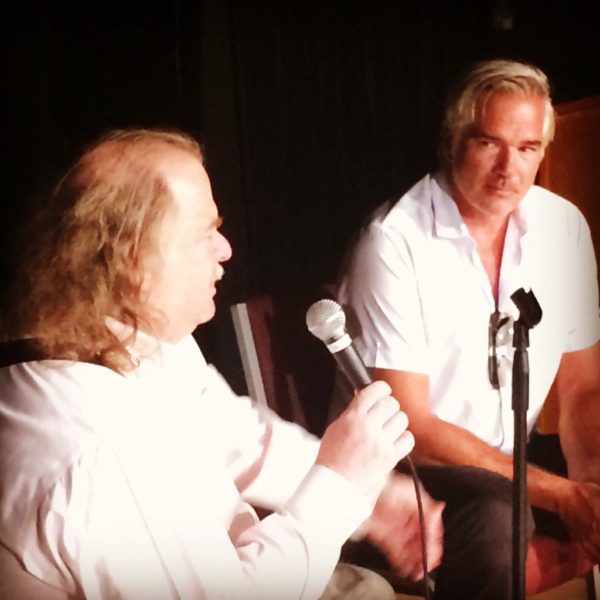Big Data vs. Ojai
Online behemoths threaten Ojai’s quality of life
By Bret Bradigan

From the LA Times: Jonathan Gold, restaurant critic for the Los Angeles Times, with OQ editor Bret Bradigan. Gold died Saturday, July 21, 2018.
Much of what contributes to Ojai’s quality of life has to do with the background hum of value being exchanged for value. It is the small businesses — the retail shops, real estate agents, restaurateurs, the plumbers, painters, we even have candlestick makers — that weave together many strands of our sturdy social fabric.
This is what late, lamented Jonathan Gold called “the miracle of entry-level capitalism,” and it forms the basis of Ojai’s community life. These small businesses donate to our many nonprofits, hosting events at their venues, giving away their expertise, coaching and teaching, serving and sharing.
That’s why megatrends like on-line shopping pose existential threats to communities like Ojai. But internet behemoths Google and Facebook aren’t the logical outcome of capitalism, they are a return to the days of the British East Indies Company, and monopolies and charter companies. Their obscene valuations — untethered to actual value given but slaves to relentless growth — break apart the trust that exists between businesses and the customers they serve. As Gifford Pinchot famously wrote, “Growth at all costs is the ideology of the cancer cell.”
Digital philosopher Douglas Rushkoff recently said in a twist on the famous poem from Martin Niemoller, “First they came for the booksellers, but I didn’t speak up because I wasn’t a bookseller. Then they came for the taxi drivers, and I did not speak out because I was not a taxi driver. Then they came for me, and there was no one left to speak for me …”
One simple cure would be to stop giving preferential treatment to capital gains, and instead give the lower tax rates to dividends. That would put a quick halt to the enormous pressure on corporations to keep growing at all costs and instead give them incentives to start delivering value to their customers, where the actual profits exist.
“Engineers at our leading tech firms and universities tend to see human beings as the problem and technology as the solution. We they are not developing interfaces to control us, they are building intelligences to replace us,” Rushkoff wrote.
His collection of aphorisms, “Team Human,” is set to be released in the next couple of weeks. Rushkoff said on a recent “Waking Up” podcast that capitalism had a promising start when it developed in Dutch culture in the 16th century — creating great wealth, but doing so much more equally than the “winner take all” ethos of internet valuations. Back in the old days, money was a much more fluid concept; some merchants would even print their own currencies with expiration dates. It gave money a much greater “velocity,” a key concept which explains much of how capitalism adds value by promoting low-friction transactions.
It didn’t take long before this basic, value-for-value system was replaced from the top down in the form of royal charters, mercantilism and monopolies. Remember that the American Revolution was, in large part, a reaction to that monopolistic system; the Boston Tea Party being just one example of people rising up against economic oppression.
We have now depersonalized many of our most mundane transactions as social media monetizes our attention with pop-up ads and its gathering of enormous privacy-destroying databases.
Imagine the outcry if government had decreed that we must all carry tracking devices on our persons at all times. Now imagine how often we ask ourselves, “Now where did I leave my phone?” How did we get to the point where we would so easily and eagerly toss aside our anonymity? It’s ironic that it seemed like we had much less privacy before the internet, because we were actually interacting with dozens of people in an average day; now, we are much more likely to be alone, and yet more is known of us than ever, thanks to Big Data.
Rushkoff remains cautiously optimistic, “Digital-age technologies have only amplified these trends, presenting the greatest challenges yet to our collective autonomy: robots taking our jobs, algorithms directing our attention, and social media undermining our democracy. But all is not lost. It’s time for Team Human to take a stand, regenerate the social bonds that define us and, together, make a positive impact on this earth.
“The first step toward reversing our predicament is to recognize that being human is a team sport. We cannot be fully human alone. Anything that brings us together fosters our humanity,” Rushkoff writes. That’s about as good a mission statement for a community like Ojai as any.
Slightly off-topic: Given that we are in the Information Age, and therefore information workers control the means of production with their brains, you could argue that we have seen Communism’s final triumph. Discuss among yourselves.


Leave A Comment